Psychological Interventions for Nigerian Children Exposed to Violence
VerifiedAdded on 2023/06/10
|9
|2231
|87
Essay
AI Summary
This essay examines the psychological impact of violence on Nigerian immigrant children, highlighting the mental health issues they face, such as anxiety and depression, and the potential for a cycle of violence. It emphasizes the importance of culturally sensitive interventions by healthcare professionals and the government to improve their quality of life. The essay discusses how exposure to violence, whether direct or indirect, can lead to attachment problems, regressive behaviors, and cognitive difficulties. It also addresses the need for early interventions, including high-quality education programs and mental health services, to help these children cope with stressors and develop healthy coping mechanisms. Ethical considerations, such as obtaining informed consent and respecting cultural traditions, are also discussed in the context of providing appropriate care.
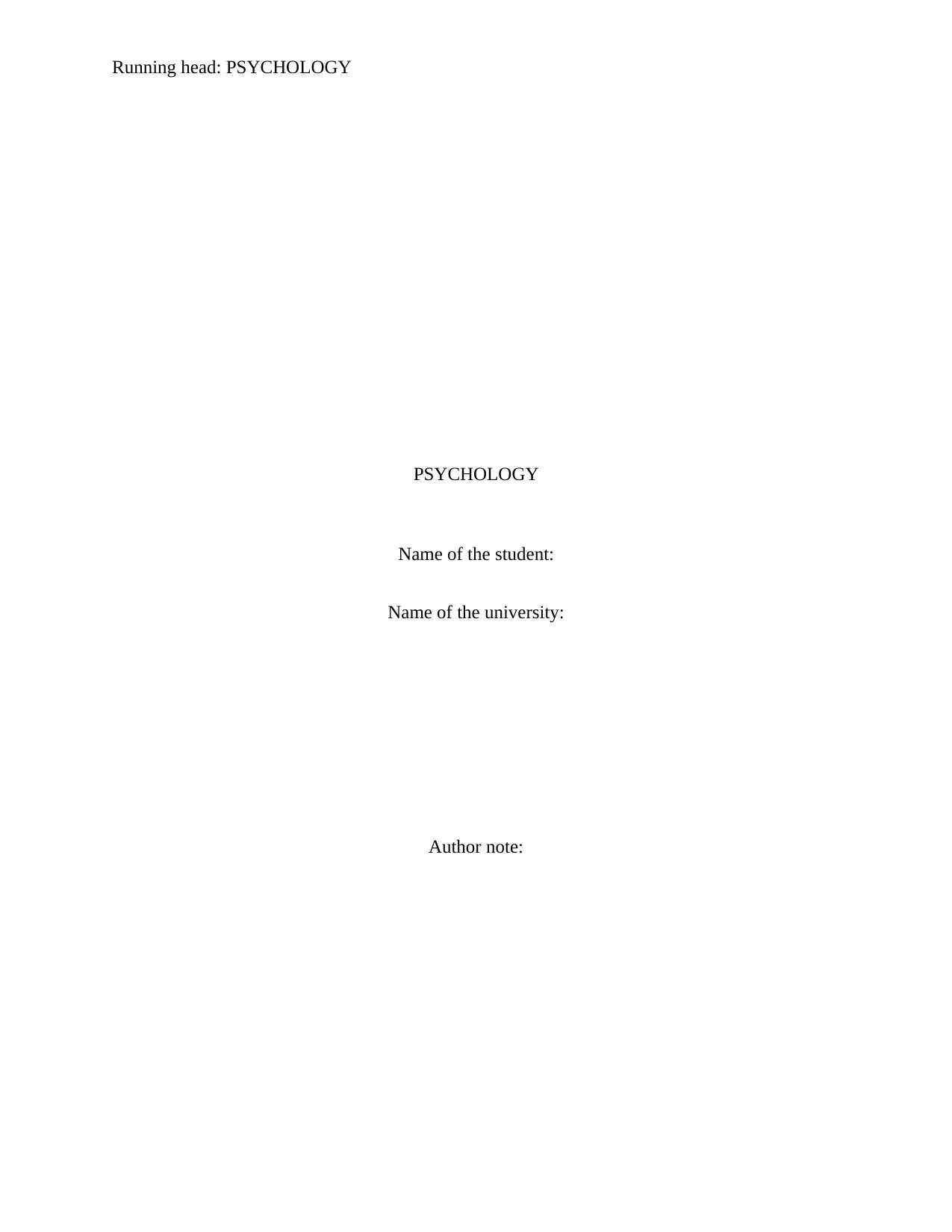
Running head: PSYCHOLOGY
PSYCHOLOGY
Name of the student:
Name of the university:
Author note:
PSYCHOLOGY
Name of the student:
Name of the university:
Author note:
Paraphrase This Document
Need a fresh take? Get an instant paraphrase of this document with our AI Paraphraser
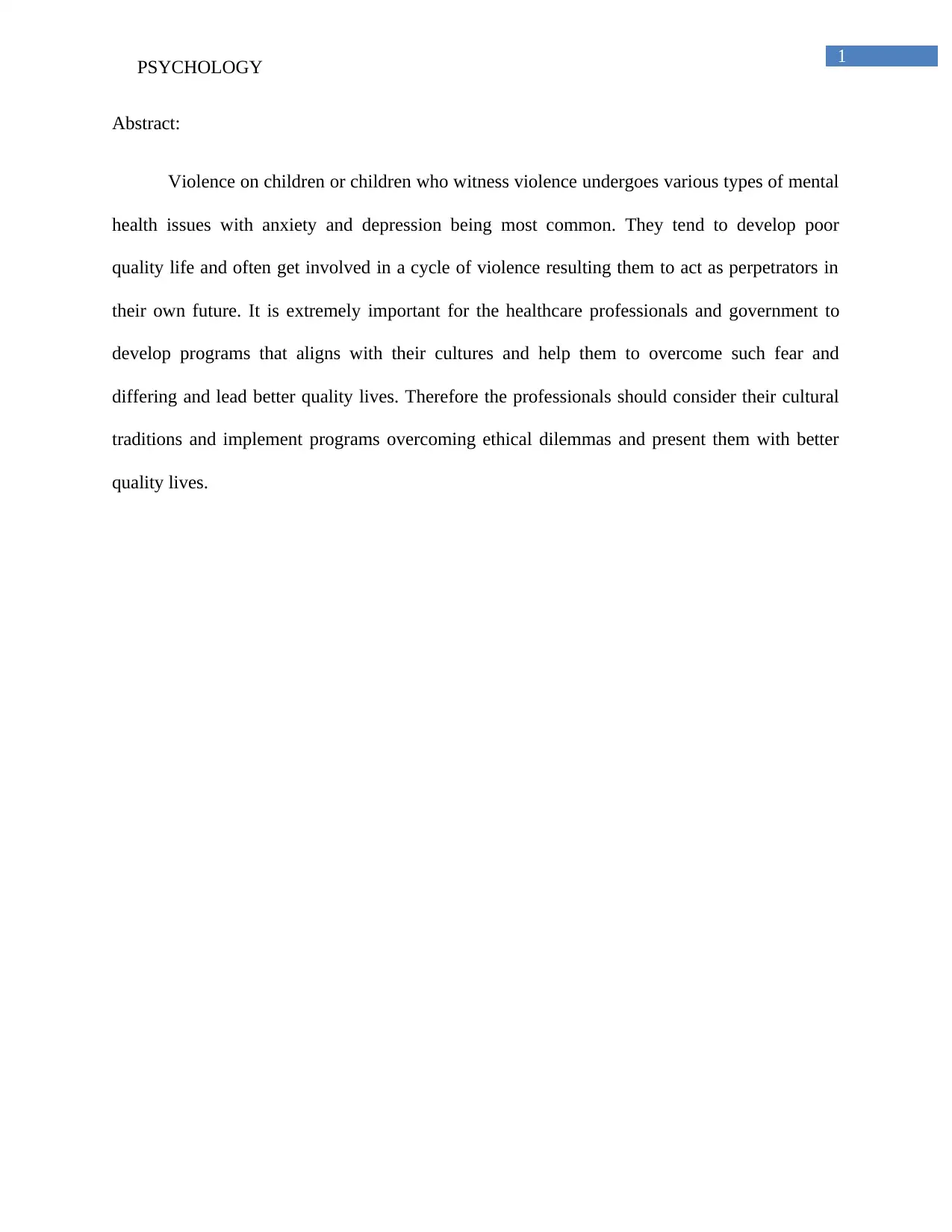
1
PSYCHOLOGY
Abstract:
Violence on children or children who witness violence undergoes various types of mental
health issues with anxiety and depression being most common. They tend to develop poor
quality life and often get involved in a cycle of violence resulting them to act as perpetrators in
their own future. It is extremely important for the healthcare professionals and government to
develop programs that aligns with their cultures and help them to overcome such fear and
differing and lead better quality lives. Therefore the professionals should consider their cultural
traditions and implement programs overcoming ethical dilemmas and present them with better
quality lives.
PSYCHOLOGY
Abstract:
Violence on children or children who witness violence undergoes various types of mental
health issues with anxiety and depression being most common. They tend to develop poor
quality life and often get involved in a cycle of violence resulting them to act as perpetrators in
their own future. It is extremely important for the healthcare professionals and government to
develop programs that aligns with their cultures and help them to overcome such fear and
differing and lead better quality lives. Therefore the professionals should consider their cultural
traditions and implement programs overcoming ethical dilemmas and present them with better
quality lives.
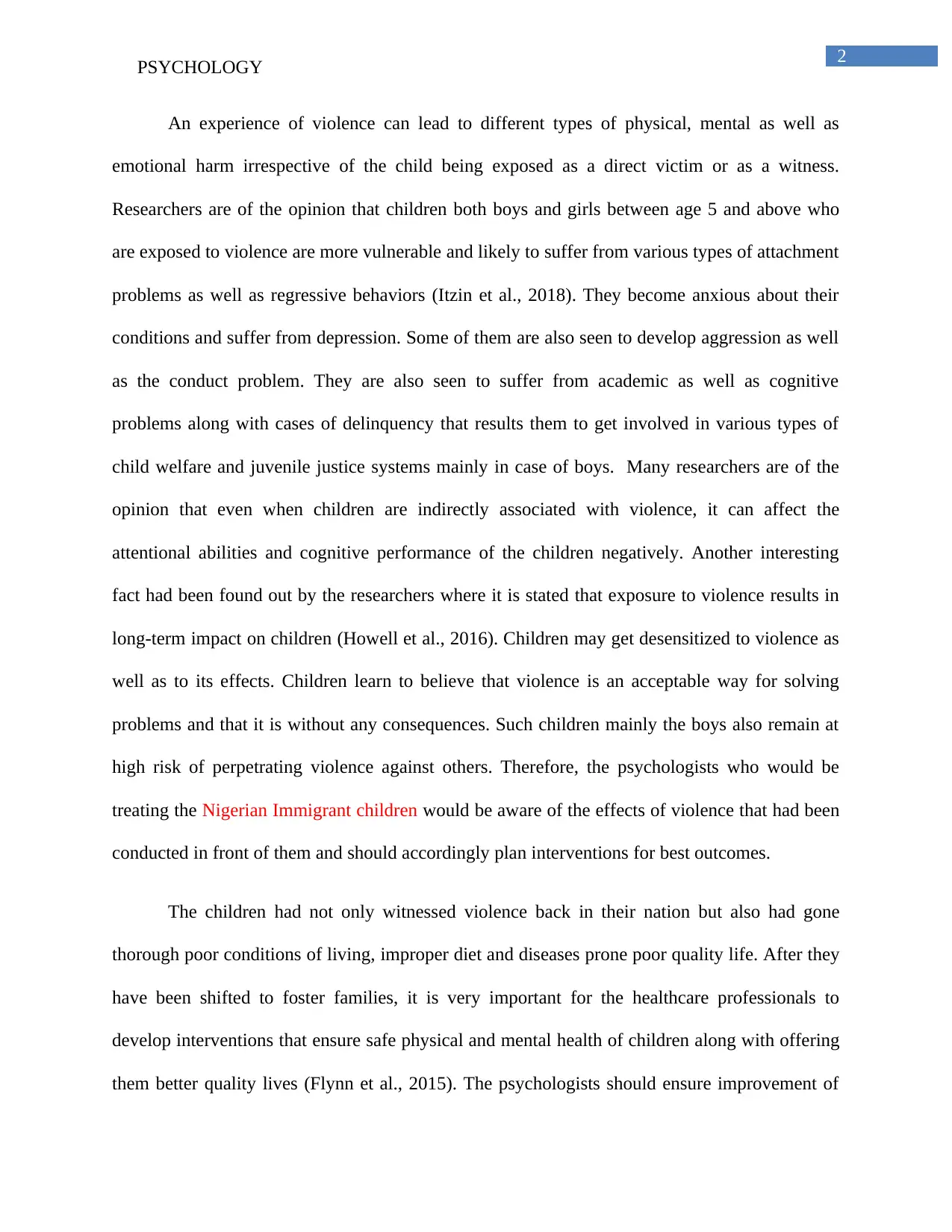
2
PSYCHOLOGY
An experience of violence can lead to different types of physical, mental as well as
emotional harm irrespective of the child being exposed as a direct victim or as a witness.
Researchers are of the opinion that children both boys and girls between age 5 and above who
are exposed to violence are more vulnerable and likely to suffer from various types of attachment
problems as well as regressive behaviors (Itzin et al., 2018). They become anxious about their
conditions and suffer from depression. Some of them are also seen to develop aggression as well
as the conduct problem. They are also seen to suffer from academic as well as cognitive
problems along with cases of delinquency that results them to get involved in various types of
child welfare and juvenile justice systems mainly in case of boys. Many researchers are of the
opinion that even when children are indirectly associated with violence, it can affect the
attentional abilities and cognitive performance of the children negatively. Another interesting
fact had been found out by the researchers where it is stated that exposure to violence results in
long-term impact on children (Howell et al., 2016). Children may get desensitized to violence as
well as to its effects. Children learn to believe that violence is an acceptable way for solving
problems and that it is without any consequences. Such children mainly the boys also remain at
high risk of perpetrating violence against others. Therefore, the psychologists who would be
treating the Nigerian Immigrant children would be aware of the effects of violence that had been
conducted in front of them and should accordingly plan interventions for best outcomes.
The children had not only witnessed violence back in their nation but also had gone
thorough poor conditions of living, improper diet and diseases prone poor quality life. After they
have been shifted to foster families, it is very important for the healthcare professionals to
develop interventions that ensure safe physical and mental health of children along with offering
them better quality lives (Flynn et al., 2015). The psychologists should ensure improvement of
PSYCHOLOGY
An experience of violence can lead to different types of physical, mental as well as
emotional harm irrespective of the child being exposed as a direct victim or as a witness.
Researchers are of the opinion that children both boys and girls between age 5 and above who
are exposed to violence are more vulnerable and likely to suffer from various types of attachment
problems as well as regressive behaviors (Itzin et al., 2018). They become anxious about their
conditions and suffer from depression. Some of them are also seen to develop aggression as well
as the conduct problem. They are also seen to suffer from academic as well as cognitive
problems along with cases of delinquency that results them to get involved in various types of
child welfare and juvenile justice systems mainly in case of boys. Many researchers are of the
opinion that even when children are indirectly associated with violence, it can affect the
attentional abilities and cognitive performance of the children negatively. Another interesting
fact had been found out by the researchers where it is stated that exposure to violence results in
long-term impact on children (Howell et al., 2016). Children may get desensitized to violence as
well as to its effects. Children learn to believe that violence is an acceptable way for solving
problems and that it is without any consequences. Such children mainly the boys also remain at
high risk of perpetrating violence against others. Therefore, the psychologists who would be
treating the Nigerian Immigrant children would be aware of the effects of violence that had been
conducted in front of them and should accordingly plan interventions for best outcomes.
The children had not only witnessed violence back in their nation but also had gone
thorough poor conditions of living, improper diet and diseases prone poor quality life. After they
have been shifted to foster families, it is very important for the healthcare professionals to
develop interventions that ensure safe physical and mental health of children along with offering
them better quality lives (Flynn et al., 2015). The psychologists should ensure improvement of
⊘ This is a preview!⊘
Do you want full access?
Subscribe today to unlock all pages.

Trusted by 1+ million students worldwide
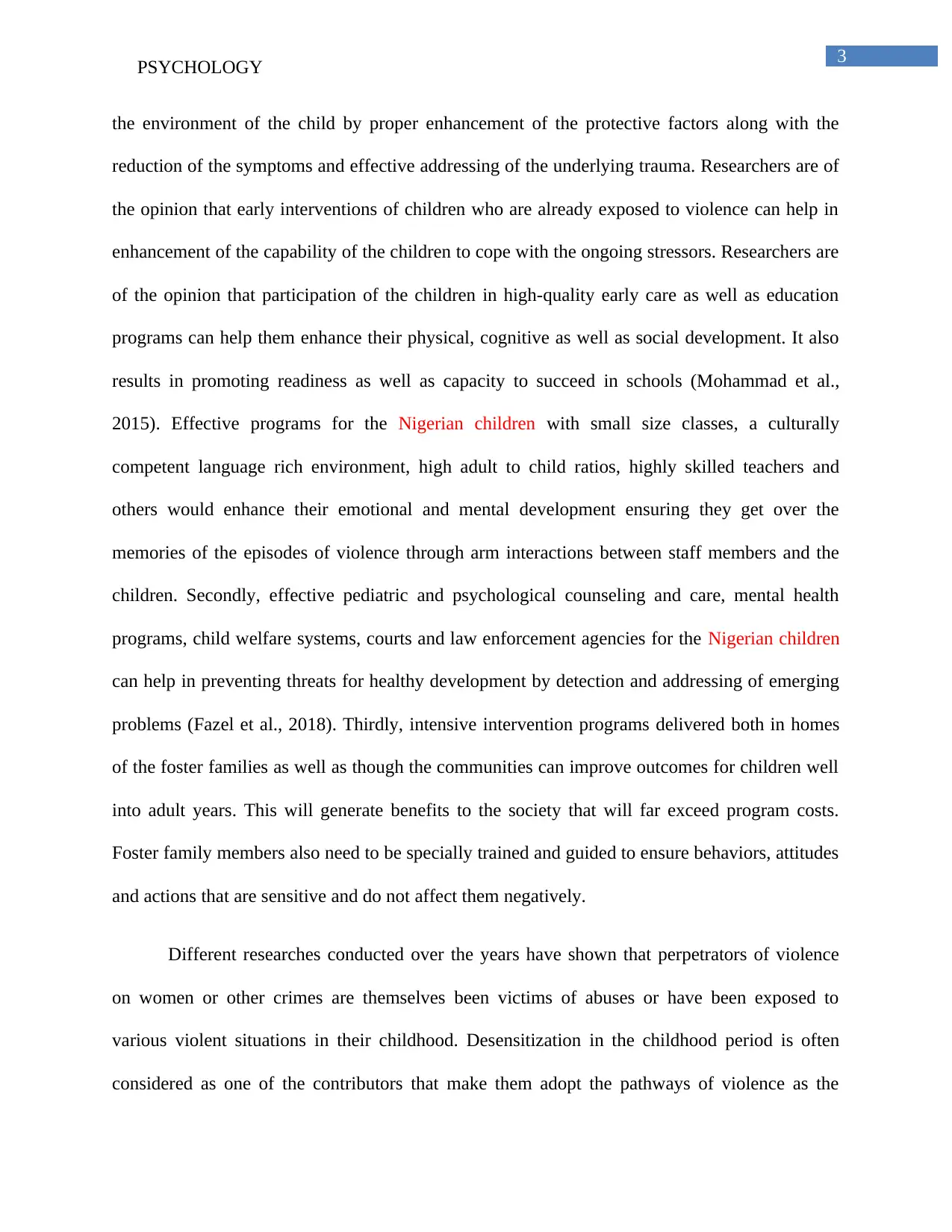
3
PSYCHOLOGY
the environment of the child by proper enhancement of the protective factors along with the
reduction of the symptoms and effective addressing of the underlying trauma. Researchers are of
the opinion that early interventions of children who are already exposed to violence can help in
enhancement of the capability of the children to cope with the ongoing stressors. Researchers are
of the opinion that participation of the children in high-quality early care as well as education
programs can help them enhance their physical, cognitive as well as social development. It also
results in promoting readiness as well as capacity to succeed in schools (Mohammad et al.,
2015). Effective programs for the Nigerian children with small size classes, a culturally
competent language rich environment, high adult to child ratios, highly skilled teachers and
others would enhance their emotional and mental development ensuring they get over the
memories of the episodes of violence through arm interactions between staff members and the
children. Secondly, effective pediatric and psychological counseling and care, mental health
programs, child welfare systems, courts and law enforcement agencies for the Nigerian children
can help in preventing threats for healthy development by detection and addressing of emerging
problems (Fazel et al., 2018). Thirdly, intensive intervention programs delivered both in homes
of the foster families as well as though the communities can improve outcomes for children well
into adult years. This will generate benefits to the society that will far exceed program costs.
Foster family members also need to be specially trained and guided to ensure behaviors, attitudes
and actions that are sensitive and do not affect them negatively.
Different researches conducted over the years have shown that perpetrators of violence
on women or other crimes are themselves been victims of abuses or have been exposed to
various violent situations in their childhood. Desensitization in the childhood period is often
considered as one of the contributors that make them adopt the pathways of violence as the
PSYCHOLOGY
the environment of the child by proper enhancement of the protective factors along with the
reduction of the symptoms and effective addressing of the underlying trauma. Researchers are of
the opinion that early interventions of children who are already exposed to violence can help in
enhancement of the capability of the children to cope with the ongoing stressors. Researchers are
of the opinion that participation of the children in high-quality early care as well as education
programs can help them enhance their physical, cognitive as well as social development. It also
results in promoting readiness as well as capacity to succeed in schools (Mohammad et al.,
2015). Effective programs for the Nigerian children with small size classes, a culturally
competent language rich environment, high adult to child ratios, highly skilled teachers and
others would enhance their emotional and mental development ensuring they get over the
memories of the episodes of violence through arm interactions between staff members and the
children. Secondly, effective pediatric and psychological counseling and care, mental health
programs, child welfare systems, courts and law enforcement agencies for the Nigerian children
can help in preventing threats for healthy development by detection and addressing of emerging
problems (Fazel et al., 2018). Thirdly, intensive intervention programs delivered both in homes
of the foster families as well as though the communities can improve outcomes for children well
into adult years. This will generate benefits to the society that will far exceed program costs.
Foster family members also need to be specially trained and guided to ensure behaviors, attitudes
and actions that are sensitive and do not affect them negatively.
Different researches conducted over the years have shown that perpetrators of violence
on women or other crimes are themselves been victims of abuses or have been exposed to
various violent situations in their childhood. Desensitization in the childhood period is often
considered as one of the contributors that make them adopt the pathways of violence as the
Paraphrase This Document
Need a fresh take? Get an instant paraphrase of this document with our AI Paraphraser
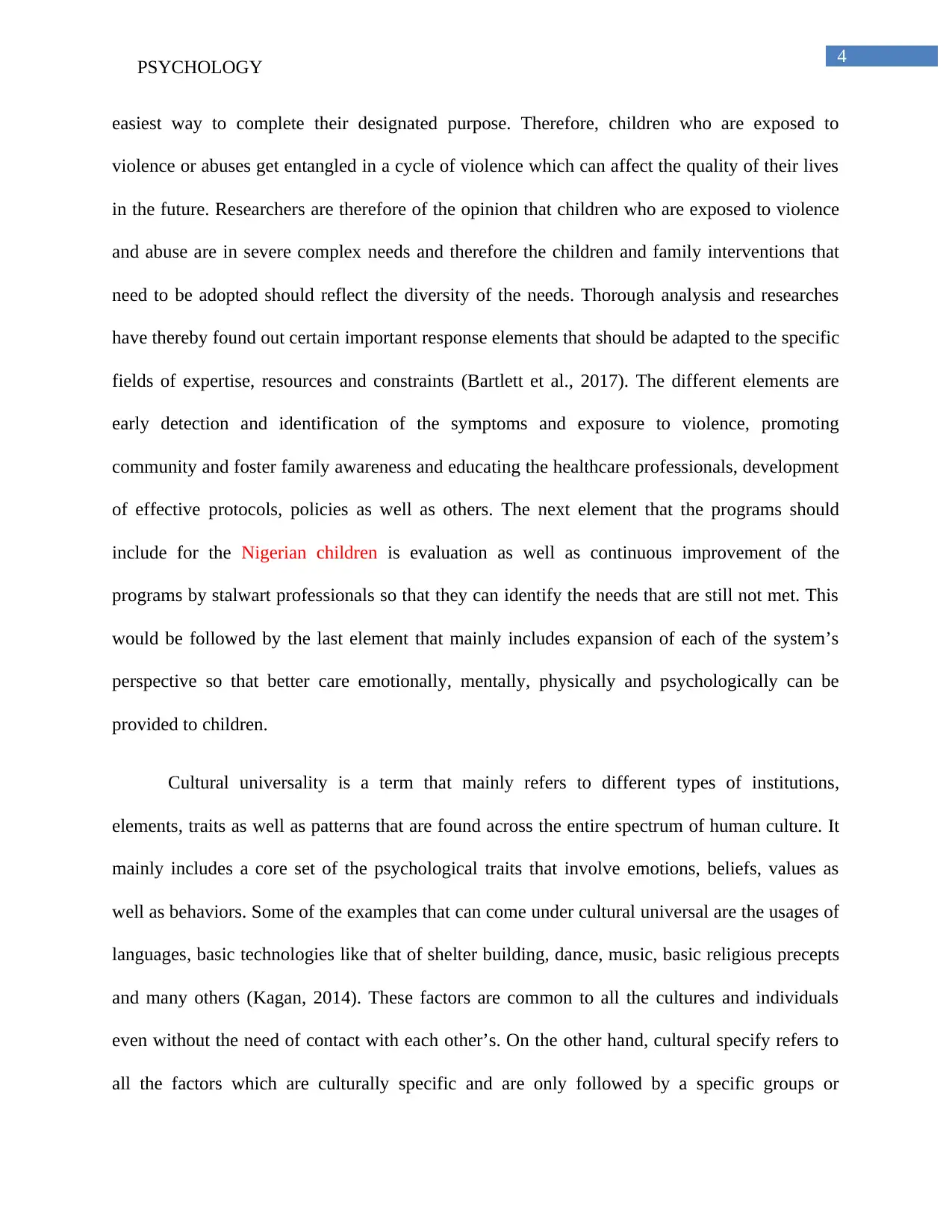
4
PSYCHOLOGY
easiest way to complete their designated purpose. Therefore, children who are exposed to
violence or abuses get entangled in a cycle of violence which can affect the quality of their lives
in the future. Researchers are therefore of the opinion that children who are exposed to violence
and abuse are in severe complex needs and therefore the children and family interventions that
need to be adopted should reflect the diversity of the needs. Thorough analysis and researches
have thereby found out certain important response elements that should be adapted to the specific
fields of expertise, resources and constraints (Bartlett et al., 2017). The different elements are
early detection and identification of the symptoms and exposure to violence, promoting
community and foster family awareness and educating the healthcare professionals, development
of effective protocols, policies as well as others. The next element that the programs should
include for the Nigerian children is evaluation as well as continuous improvement of the
programs by stalwart professionals so that they can identify the needs that are still not met. This
would be followed by the last element that mainly includes expansion of each of the system’s
perspective so that better care emotionally, mentally, physically and psychologically can be
provided to children.
Cultural universality is a term that mainly refers to different types of institutions,
elements, traits as well as patterns that are found across the entire spectrum of human culture. It
mainly includes a core set of the psychological traits that involve emotions, beliefs, values as
well as behaviors. Some of the examples that can come under cultural universal are the usages of
languages, basic technologies like that of shelter building, dance, music, basic religious precepts
and many others (Kagan, 2014). These factors are common to all the cultures and individuals
even without the need of contact with each other’s. On the other hand, cultural specify refers to
all the factors which are culturally specific and are only followed by a specific groups or
PSYCHOLOGY
easiest way to complete their designated purpose. Therefore, children who are exposed to
violence or abuses get entangled in a cycle of violence which can affect the quality of their lives
in the future. Researchers are therefore of the opinion that children who are exposed to violence
and abuse are in severe complex needs and therefore the children and family interventions that
need to be adopted should reflect the diversity of the needs. Thorough analysis and researches
have thereby found out certain important response elements that should be adapted to the specific
fields of expertise, resources and constraints (Bartlett et al., 2017). The different elements are
early detection and identification of the symptoms and exposure to violence, promoting
community and foster family awareness and educating the healthcare professionals, development
of effective protocols, policies as well as others. The next element that the programs should
include for the Nigerian children is evaluation as well as continuous improvement of the
programs by stalwart professionals so that they can identify the needs that are still not met. This
would be followed by the last element that mainly includes expansion of each of the system’s
perspective so that better care emotionally, mentally, physically and psychologically can be
provided to children.
Cultural universality is a term that mainly refers to different types of institutions,
elements, traits as well as patterns that are found across the entire spectrum of human culture. It
mainly includes a core set of the psychological traits that involve emotions, beliefs, values as
well as behaviors. Some of the examples that can come under cultural universal are the usages of
languages, basic technologies like that of shelter building, dance, music, basic religious precepts
and many others (Kagan, 2014). These factors are common to all the cultures and individuals
even without the need of contact with each other’s. On the other hand, cultural specify refers to
all the factors which are culturally specific and are only followed by a specific groups or
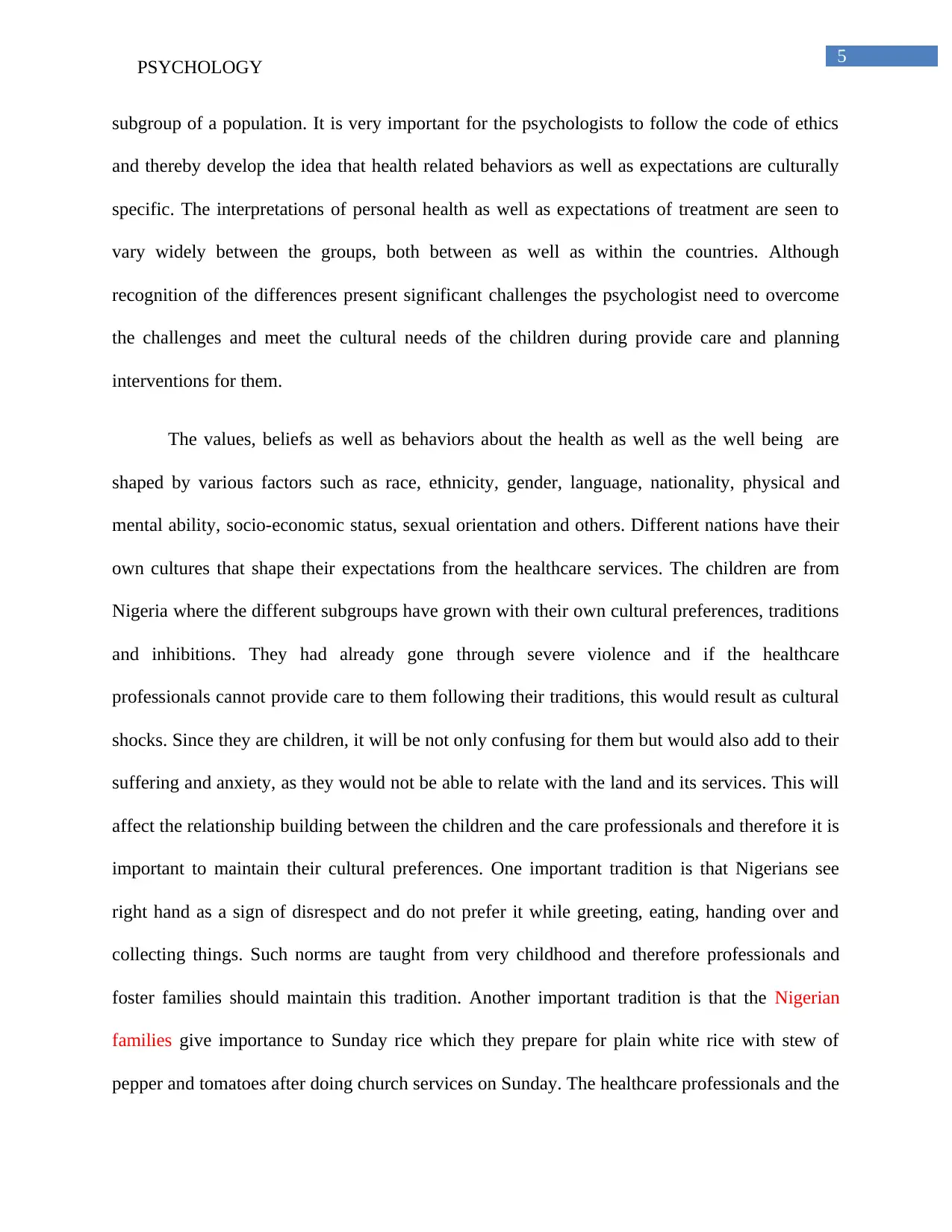
5
PSYCHOLOGY
subgroup of a population. It is very important for the psychologists to follow the code of ethics
and thereby develop the idea that health related behaviors as well as expectations are culturally
specific. The interpretations of personal health as well as expectations of treatment are seen to
vary widely between the groups, both between as well as within the countries. Although
recognition of the differences present significant challenges the psychologist need to overcome
the challenges and meet the cultural needs of the children during provide care and planning
interventions for them.
The values, beliefs as well as behaviors about the health as well as the well being are
shaped by various factors such as race, ethnicity, gender, language, nationality, physical and
mental ability, socio-economic status, sexual orientation and others. Different nations have their
own cultures that shape their expectations from the healthcare services. The children are from
Nigeria where the different subgroups have grown with their own cultural preferences, traditions
and inhibitions. They had already gone through severe violence and if the healthcare
professionals cannot provide care to them following their traditions, this would result as cultural
shocks. Since they are children, it will be not only confusing for them but would also add to their
suffering and anxiety, as they would not be able to relate with the land and its services. This will
affect the relationship building between the children and the care professionals and therefore it is
important to maintain their cultural preferences. One important tradition is that Nigerians see
right hand as a sign of disrespect and do not prefer it while greeting, eating, handing over and
collecting things. Such norms are taught from very childhood and therefore professionals and
foster families should maintain this tradition. Another important tradition is that the Nigerian
families give importance to Sunday rice which they prepare for plain white rice with stew of
pepper and tomatoes after doing church services on Sunday. The healthcare professionals and the
PSYCHOLOGY
subgroup of a population. It is very important for the psychologists to follow the code of ethics
and thereby develop the idea that health related behaviors as well as expectations are culturally
specific. The interpretations of personal health as well as expectations of treatment are seen to
vary widely between the groups, both between as well as within the countries. Although
recognition of the differences present significant challenges the psychologist need to overcome
the challenges and meet the cultural needs of the children during provide care and planning
interventions for them.
The values, beliefs as well as behaviors about the health as well as the well being are
shaped by various factors such as race, ethnicity, gender, language, nationality, physical and
mental ability, socio-economic status, sexual orientation and others. Different nations have their
own cultures that shape their expectations from the healthcare services. The children are from
Nigeria where the different subgroups have grown with their own cultural preferences, traditions
and inhibitions. They had already gone through severe violence and if the healthcare
professionals cannot provide care to them following their traditions, this would result as cultural
shocks. Since they are children, it will be not only confusing for them but would also add to their
suffering and anxiety, as they would not be able to relate with the land and its services. This will
affect the relationship building between the children and the care professionals and therefore it is
important to maintain their cultural preferences. One important tradition is that Nigerians see
right hand as a sign of disrespect and do not prefer it while greeting, eating, handing over and
collecting things. Such norms are taught from very childhood and therefore professionals and
foster families should maintain this tradition. Another important tradition is that the Nigerian
families give importance to Sunday rice which they prepare for plain white rice with stew of
pepper and tomatoes after doing church services on Sunday. The healthcare professionals and the
⊘ This is a preview!⊘
Do you want full access?
Subscribe today to unlock all pages.

Trusted by 1+ million students worldwide
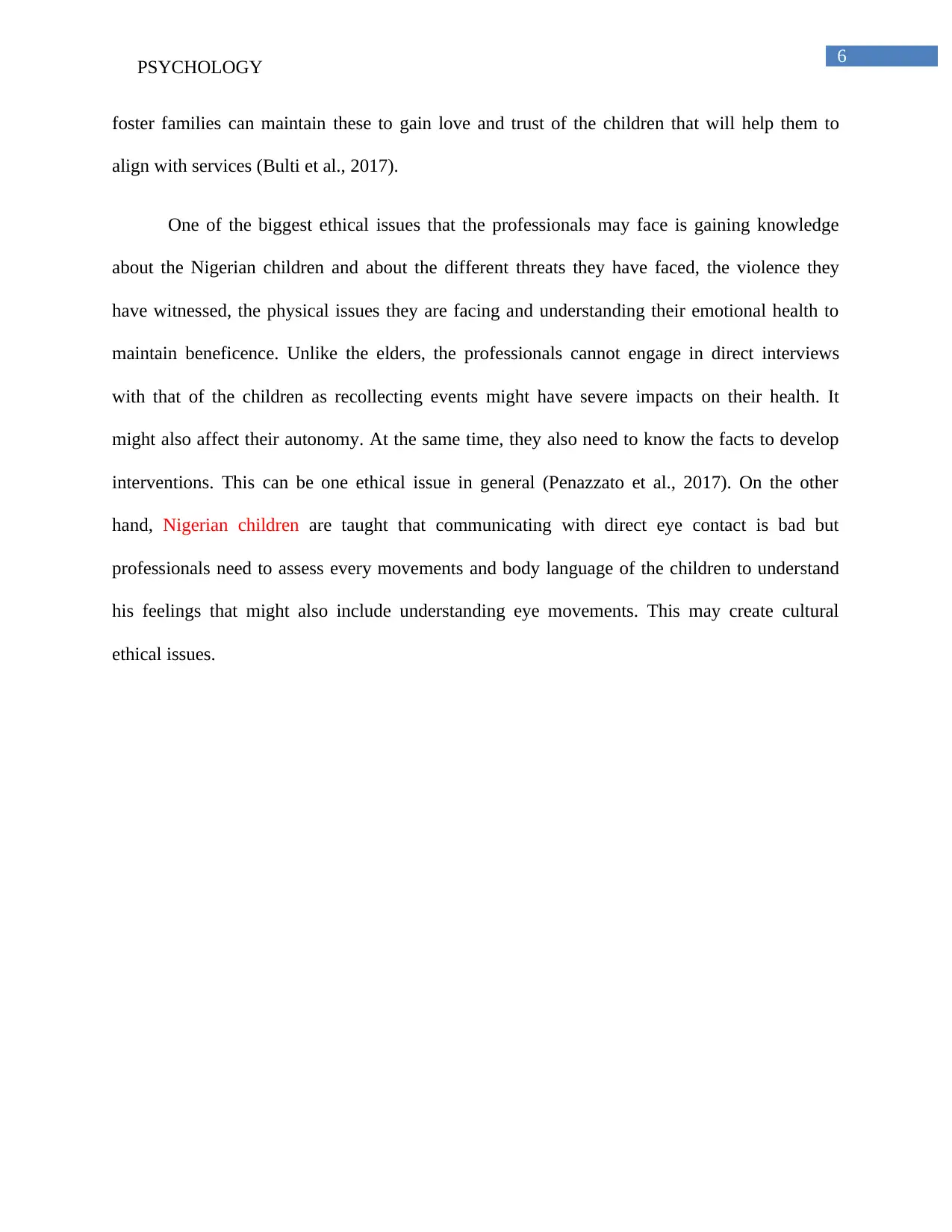
6
PSYCHOLOGY
foster families can maintain these to gain love and trust of the children that will help them to
align with services (Bulti et al., 2017).
One of the biggest ethical issues that the professionals may face is gaining knowledge
about the Nigerian children and about the different threats they have faced, the violence they
have witnessed, the physical issues they are facing and understanding their emotional health to
maintain beneficence. Unlike the elders, the professionals cannot engage in direct interviews
with that of the children as recollecting events might have severe impacts on their health. It
might also affect their autonomy. At the same time, they also need to know the facts to develop
interventions. This can be one ethical issue in general (Penazzato et al., 2017). On the other
hand, Nigerian children are taught that communicating with direct eye contact is bad but
professionals need to assess every movements and body language of the children to understand
his feelings that might also include understanding eye movements. This may create cultural
ethical issues.
PSYCHOLOGY
foster families can maintain these to gain love and trust of the children that will help them to
align with services (Bulti et al., 2017).
One of the biggest ethical issues that the professionals may face is gaining knowledge
about the Nigerian children and about the different threats they have faced, the violence they
have witnessed, the physical issues they are facing and understanding their emotional health to
maintain beneficence. Unlike the elders, the professionals cannot engage in direct interviews
with that of the children as recollecting events might have severe impacts on their health. It
might also affect their autonomy. At the same time, they also need to know the facts to develop
interventions. This can be one ethical issue in general (Penazzato et al., 2017). On the other
hand, Nigerian children are taught that communicating with direct eye contact is bad but
professionals need to assess every movements and body language of the children to understand
his feelings that might also include understanding eye movements. This may create cultural
ethical issues.
Paraphrase This Document
Need a fresh take? Get an instant paraphrase of this document with our AI Paraphraser
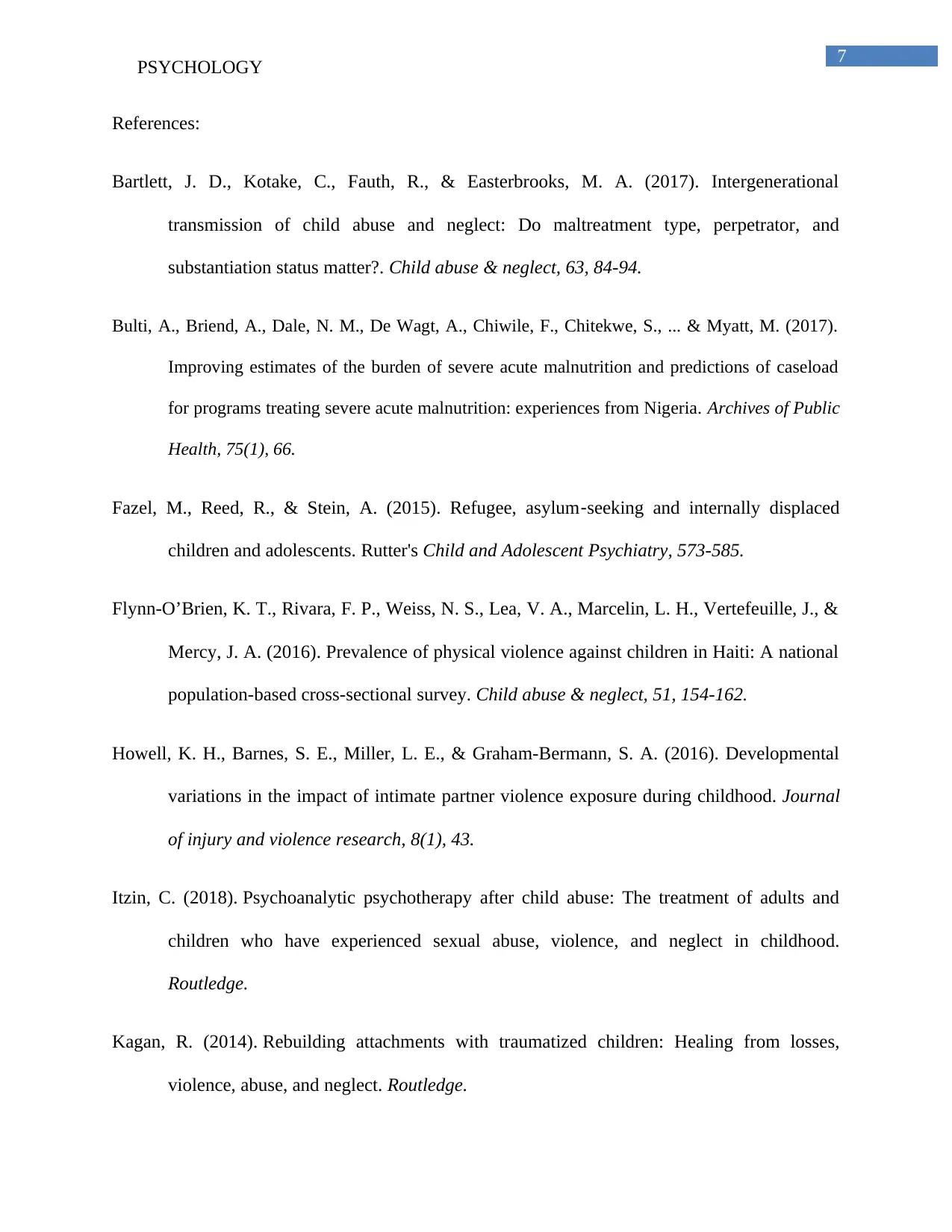
7
PSYCHOLOGY
References:
Bartlett, J. D., Kotake, C., Fauth, R., & Easterbrooks, M. A. (2017). Intergenerational
transmission of child abuse and neglect: Do maltreatment type, perpetrator, and
substantiation status matter?. Child abuse & neglect, 63, 84-94.
Bulti, A., Briend, A., Dale, N. M., De Wagt, A., Chiwile, F., Chitekwe, S., ... & Myatt, M. (2017).
Improving estimates of the burden of severe acute malnutrition and predictions of caseload
for programs treating severe acute malnutrition: experiences from Nigeria. Archives of Public
Health, 75(1), 66.
Fazel, M., Reed, R., & Stein, A. (2015). Refugee, asylum‐seeking and internally displaced
children and adolescents. Rutter's Child and Adolescent Psychiatry, 573-585.
Flynn-O’Brien, K. T., Rivara, F. P., Weiss, N. S., Lea, V. A., Marcelin, L. H., Vertefeuille, J., &
Mercy, J. A. (2016). Prevalence of physical violence against children in Haiti: A national
population-based cross-sectional survey. Child abuse & neglect, 51, 154-162.
Howell, K. H., Barnes, S. E., Miller, L. E., & Graham-Bermann, S. A. (2016). Developmental
variations in the impact of intimate partner violence exposure during childhood. Journal
of injury and violence research, 8(1), 43.
Itzin, C. (2018). Psychoanalytic psychotherapy after child abuse: The treatment of adults and
children who have experienced sexual abuse, violence, and neglect in childhood.
Routledge.
Kagan, R. (2014). Rebuilding attachments with traumatized children: Healing from losses,
violence, abuse, and neglect. Routledge.
PSYCHOLOGY
References:
Bartlett, J. D., Kotake, C., Fauth, R., & Easterbrooks, M. A. (2017). Intergenerational
transmission of child abuse and neglect: Do maltreatment type, perpetrator, and
substantiation status matter?. Child abuse & neglect, 63, 84-94.
Bulti, A., Briend, A., Dale, N. M., De Wagt, A., Chiwile, F., Chitekwe, S., ... & Myatt, M. (2017).
Improving estimates of the burden of severe acute malnutrition and predictions of caseload
for programs treating severe acute malnutrition: experiences from Nigeria. Archives of Public
Health, 75(1), 66.
Fazel, M., Reed, R., & Stein, A. (2015). Refugee, asylum‐seeking and internally displaced
children and adolescents. Rutter's Child and Adolescent Psychiatry, 573-585.
Flynn-O’Brien, K. T., Rivara, F. P., Weiss, N. S., Lea, V. A., Marcelin, L. H., Vertefeuille, J., &
Mercy, J. A. (2016). Prevalence of physical violence against children in Haiti: A national
population-based cross-sectional survey. Child abuse & neglect, 51, 154-162.
Howell, K. H., Barnes, S. E., Miller, L. E., & Graham-Bermann, S. A. (2016). Developmental
variations in the impact of intimate partner violence exposure during childhood. Journal
of injury and violence research, 8(1), 43.
Itzin, C. (2018). Psychoanalytic psychotherapy after child abuse: The treatment of adults and
children who have experienced sexual abuse, violence, and neglect in childhood.
Routledge.
Kagan, R. (2014). Rebuilding attachments with traumatized children: Healing from losses,
violence, abuse, and neglect. Routledge.
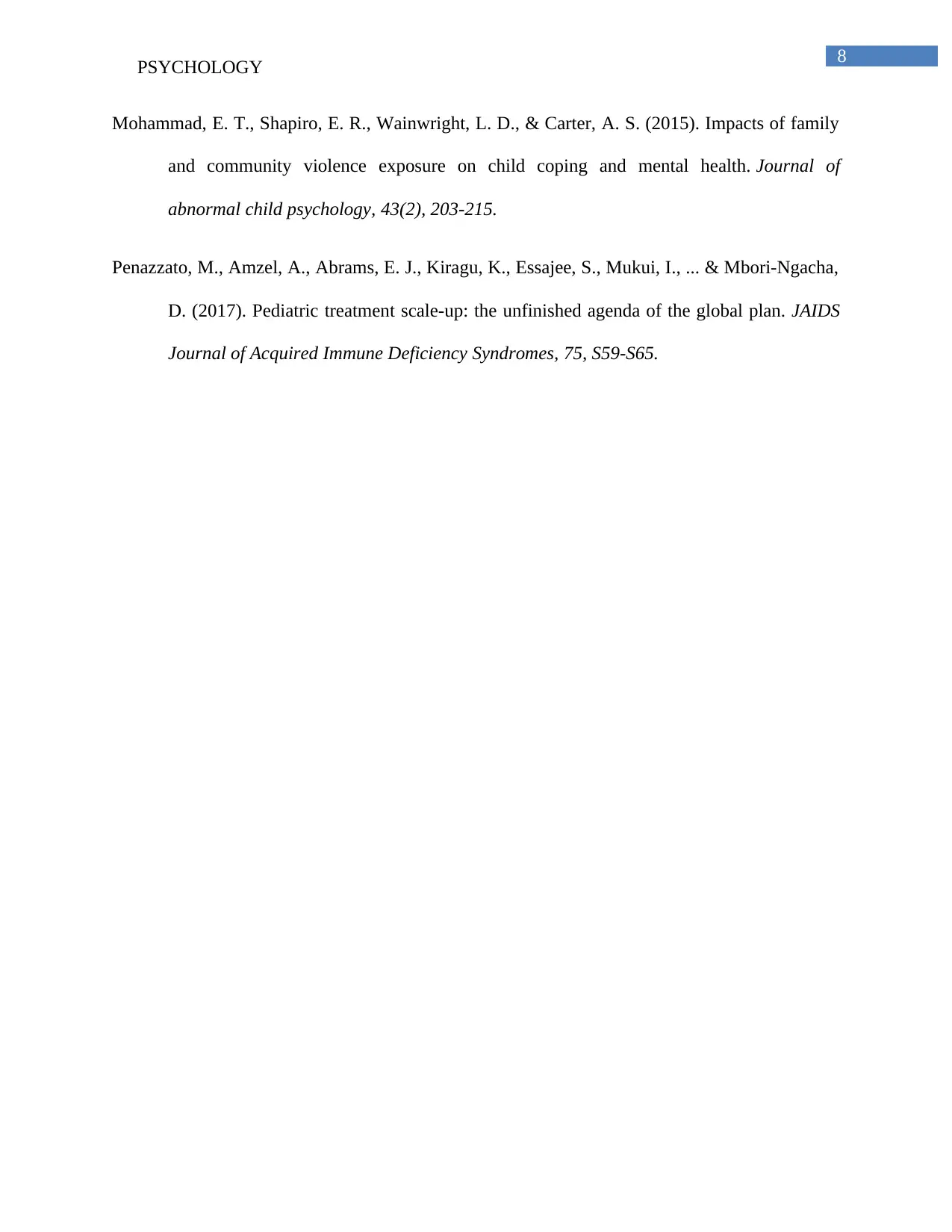
8
PSYCHOLOGY
Mohammad, E. T., Shapiro, E. R., Wainwright, L. D., & Carter, A. S. (2015). Impacts of family
and community violence exposure on child coping and mental health. Journal of
abnormal child psychology, 43(2), 203-215.
Penazzato, M., Amzel, A., Abrams, E. J., Kiragu, K., Essajee, S., Mukui, I., ... & Mbori-Ngacha,
D. (2017). Pediatric treatment scale-up: the unfinished agenda of the global plan. JAIDS
Journal of Acquired Immune Deficiency Syndromes, 75, S59-S65.
PSYCHOLOGY
Mohammad, E. T., Shapiro, E. R., Wainwright, L. D., & Carter, A. S. (2015). Impacts of family
and community violence exposure on child coping and mental health. Journal of
abnormal child psychology, 43(2), 203-215.
Penazzato, M., Amzel, A., Abrams, E. J., Kiragu, K., Essajee, S., Mukui, I., ... & Mbori-Ngacha,
D. (2017). Pediatric treatment scale-up: the unfinished agenda of the global plan. JAIDS
Journal of Acquired Immune Deficiency Syndromes, 75, S59-S65.
⊘ This is a preview!⊘
Do you want full access?
Subscribe today to unlock all pages.

Trusted by 1+ million students worldwide
1 out of 9
Related Documents
Your All-in-One AI-Powered Toolkit for Academic Success.
+13062052269
info@desklib.com
Available 24*7 on WhatsApp / Email
![[object Object]](/_next/static/media/star-bottom.7253800d.svg)
Unlock your academic potential
Copyright © 2020–2025 A2Z Services. All Rights Reserved. Developed and managed by ZUCOL.





